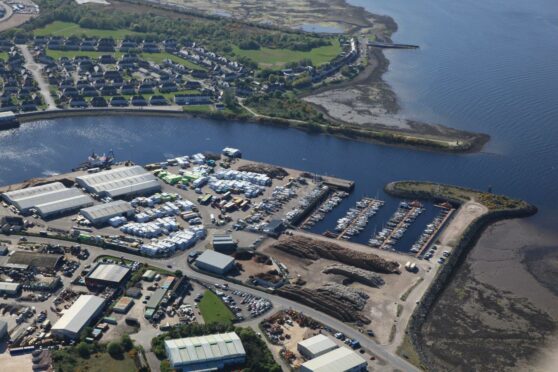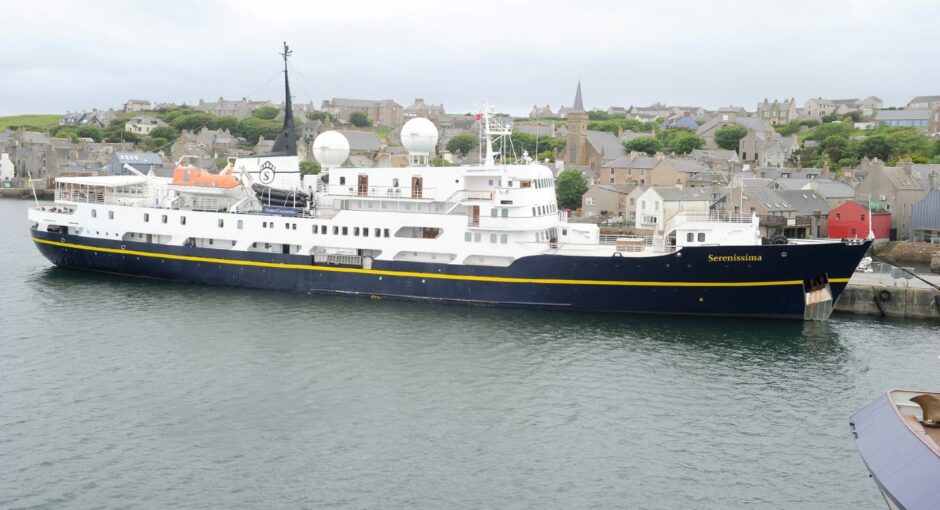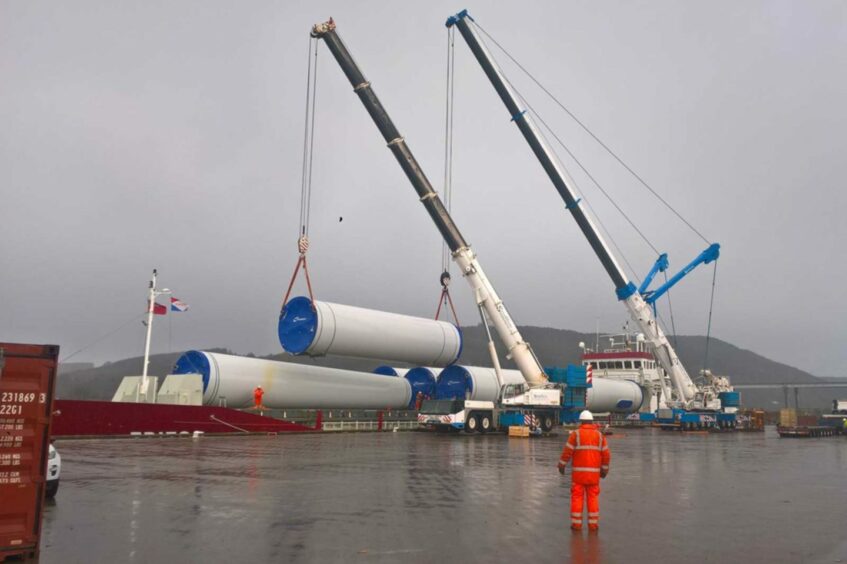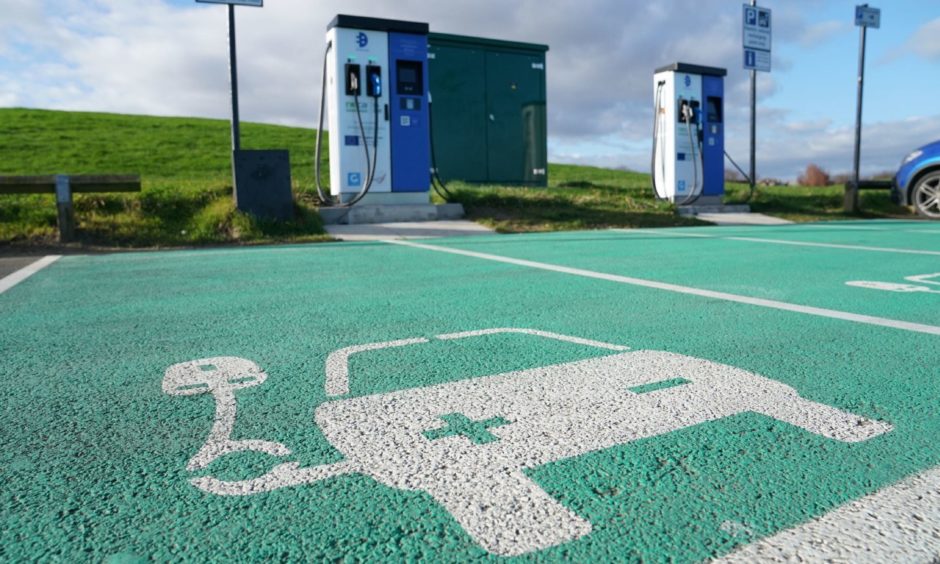Plans by the Port of Inverness to start recruiting more staff are being given priority as the company emerges from the pandemic in more buoyant mood.
In line with countless other North Scotland business, Covid-19 has forced the port to adopt radically different working policies.
However, the slowly improving health situation is now seeing the company turn its attention to more normal business practices – including taking on extra staff.
“We are a very tight-knit team of personnel, however, I am challenged by the board now to look at succession planning and how we are moving matters forward,” Port of Inverness chief executive Sinclair Browne told The Press and Journal at the company’s presentation of its 2021 annual report.
“One of those areas is looking at recruiting personnel. That will be part of the focus we have looking forward over the next six-twelve months.
“We have been sitting down with staff members and looking at areas where we need assistance.
“We are looking at increasing numbers of staff, very much so. Our full-time numbers at the moment are nine.”
Improved turnover and profit
Mr Browne made his comments as the port revealed its turnover rose 17% to £1.73 million, while profits increased to £408,000 for the 12-month period to 31 March, 2022.
Port of Inverness chairman George Macleod highlighted what he felt was a “fantastic” achievement in terms of turnover and surplus, in what has clearly been an extremely challenging period during the pandemic.
“The turnover – £1.73m – is pretty much what we expected. If we had the cruise ship side, it would have been probably up nearer the £2m mark,” he added.
“Suffice to say, that is still a very good turnover. The surplus from that, which is £408,000, that is, on the face of it, a fantastic result coming through the Covid-19 period.
“It is a real testament to the financial controls of the port.”
Port has 800-year history
Should that surplus trigger any additional staff, they will be joining a port steeped in maritime history stretching back 800 years and while a major effect of the pandemic was the cancellation of all cruise ship visits last summer, it appears as if that sector may return sooner rather than later.
“It is giving them [new recruits] an opportunity to step into a business that has been running for 800 years – probably one of Inverness’ longest continuing businesses,” added Mr Browne. “We are only going to grow, so yes, we are very much focused on that.”
The chief executive noted Inverness is now “firmly on the small expedition cruise ship circuit,” with the port poised to have them back as soon as restrictions are lifted.
Business brisk as construction industry recovers
During the reporting period components for 20 complete wind turbines from the Glen Kyllachy wind farm near Tomatin arrived and are being stored at the port until ready for transport to site. Some 12 ships also arrived from mainland Europe with the components for storage during the winter.
Arrival of logs in-bound for the Norbord facility at Morayhill continued, with the port noting demand remains strong from the construction industry. Logs were also exported, with the majority of cargoes bound for Workington in Cumbria.
Following the first lockdown, fuel imports rose and continue to be a key plank of trade for the port.
Despite the many challenges imposed by Covid-19, the port appears to have weathered the worst of the storm, with Mr Macleod bullish about the business’ prospects.
“We have been, let’s say, lucky in that we have been sheltered from the financial impact of Covid-19,” he said, adding: “It has had very little impact on us in this financial year.
“The staff have done a fantastic job and I have got to congratulate them for that.
“They worked as two teams to make sure they were separated. Different pilot boats, different harbourmasters, it really worked extremely well; that allowed us to carry on running the port without any interruptions.
Russia trade ‘all had to stop’
Given the current situation in Ukraine, the UK Government is asking companies to look at what business they have with Russia and the Port of Inverness is no exception.
“We have got a history of dealing with Russian ships and have occasionally brought in cargoes of timber from Russia,” added Mr Browne. “That has all had to stop. The number of Russian ships is probably four or five per annum.
“There is now of course the duty on us to research ship ownership. The UK Government has put it on us to make sure we have done all the necessary due diligence.”
Ship visits holding up ‘pretty nicely’
In terms of ship visits, the chairman noted these were holding up “pretty nicely” at 199, with a fair number of project cargoes, namely those featuring large or complex pieces of equipment for renewable energy or wind turbines.
Throughput of goods was 655,000 tonnes and consisted of fuel, salt and dry cargoes among others. The port however, is looking to replace what is expected to be a downturn in fuel imports with potentially more dry cargoes. “As you lose one trade, let’s find something else,” noted Mr Macleod.
Positive side to Brexit
Despite having to deal with Brexit – “just another issue”, according to Mr Browne – there was one “very positive side” of the situation to the port in terms of the Glen Kyllachy wind farm, whose cargo delivery was brought forward.
“That was supposed to come in April, 2021, but because of Brexit on December 31 2020, they wanted to move the cargo in early,” said Mr Browne. “They brought the cargo in November, which was of significant benefit to us. It was all to save port tariffs and dues – that was quite good news.
“The staff pulled together and we have had no major delays in cargo as a result of Brexit.”
What is port doing for net-zero?
The port is introducing a raft of measures to mitigate its energy consumption, as well as provide cleaner sources of power for its facilities, including the installation of solar panels on roofs and using electric vehicles.
“What are we going to do to contribute to net-zero?” said Mr Browne. “We are at the outset of our journey for our operational reduction in carbon emissions. We are updating and improving our energy management system and benchmarking that.
“We have taken some positive steps in reducing our carbon footprint, (putting) in electric charging points for forklift trucks that operate around the port. We are going to be looking at increasing our solar PV (panels), putting more facilities up on the roofs.
“We replaced all our sodium high mast lighting with LEDs, it was a no-brainer. We are monitoring now what impact that has in relation to the reduction of our electricity consumption.
“My aim is to be self-sufficient in terms of electricity generation and consumption at some point in the future.”




